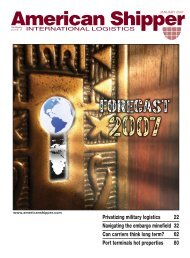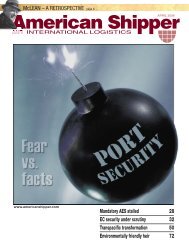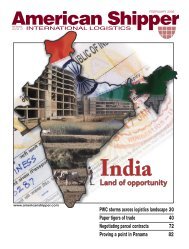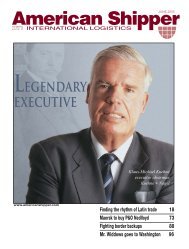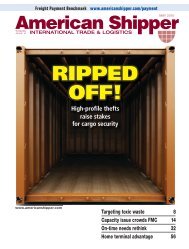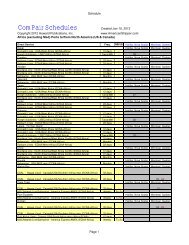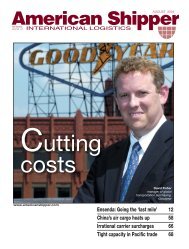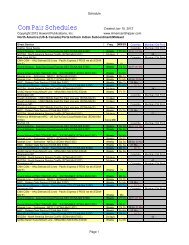Pirate Busters - American Shipper
Pirate Busters - American Shipper
Pirate Busters - American Shipper
You also want an ePaper? Increase the reach of your titles
YUMPU automatically turns print PDFs into web optimized ePapers that Google loves.
FORWARDING / NVOs<br />
40 percent of entries.<br />
About 200 companies with strong internal<br />
controls have joined the ISA program<br />
in exchange for exemptions from periodic<br />
agency audits and cargo inspections<br />
for trade violations.<br />
Many trade professionals<br />
don’t believe<br />
the benefits outweigh<br />
the significant cost associated<br />
with meeting<br />
ISA standards.<br />
Last October, CBP<br />
also launched a pilot<br />
program that expand-<br />
Baldwin<br />
ed the voluntary approach beyond customs<br />
regulations to product safety compliance.<br />
Under the BSA program, a multidisciplinary<br />
CBP team reviews completed questionnaires<br />
and visits each broker to learn<br />
how they conduct business and determine<br />
whether they are able to update and improve<br />
22 AMERICAN SHIPPER: OCTOBER 2009<br />
BSA benefits<br />
Potential trade benefits of U.S. Customs and Border Protection’s Broker<br />
Self-Assessment program:<br />
• A prior disclosure provision that would limit broker liability for self-disclosing<br />
violations to CBP, similar to how importers are treated under the Tariff Act.<br />
• Facilitating gaining a waiver for a broker district permit. Brokers must have<br />
permits to operate in each Customs district, a condition of which is a licensed<br />
individual within the district to supervise the staff in the local offices. Brokerage<br />
houses have 180 days to find a replacement if the licensed employee departs<br />
the firm, or they can apply for a waiver seeking additional time to make a hire.<br />
In some markets, it can take time to fill the job because the pool of licensed<br />
brokers is small. A company’s participation in BSA would be weighed as a<br />
favorable factor in CBP’s consideration of a waiver.<br />
• Uniformity in CBP processing so brokers receive the same treatment from<br />
port to port.<br />
• CBP assistance in developing a corrective action plan as an alternative to<br />
penalty assessments or removal from programs such as Remote Location Filing.<br />
• Assignment of an account manager. Importers and some large customs<br />
brokers are provided national account managers. A BSA program is envisioned<br />
as one way for small and medium-size brokers to get a leg up on obtaining a<br />
national account manager assigned to them and assist with uniformity issues.<br />
• Accelerated review and disposition of electronic drawback claims, reconciliation<br />
and ruling requests. (Reconciliation is the process that allows an<br />
importer to flag certain items at the time of entry for which it doesn’t have complete<br />
information and plans to submit at a later date. Information can include<br />
the value of a good, some types of classification, Harmonized Tariff Schedule<br />
headings or post-entry claims.)<br />
• Limiting brokers to single-issue audits to investigate a particular problem<br />
rather than subjecting them to full-blown regulatory audits, which are burdensome<br />
for both sides.<br />
• Consideration in disposition of a penalty case so that BSA participation<br />
becomes a factor in evaluating whether to mitigate or remove a sanction.<br />
• Enhancing the Broker Evaluation and Analysis Report that Customs<br />
provides to brokers with national account managers. The reports gives the<br />
results of compliance problems discovered through stratified, random cargo<br />
examinations. The physical inspections are done to compare the cargo with the<br />
content declarations and customs entries in terms of quantity, classification,<br />
value, country of origin and other aspects.<br />
internal controls, perform periodic testing<br />
of those controls and disclose to CBP deficiencies<br />
discovered through the testing.<br />
A key responsibility for the brokers is to<br />
maintain an audit trail linking financial<br />
records to entries filed with CBP. The<br />
government expects brokers to have strong<br />
internal controls to comply with federal<br />
regulations and act in their capacity as a<br />
fiduciary agent for importers.<br />
A permanent program would enable<br />
participating brokers to undergo fewer<br />
time-consuming audits.<br />
CBP relies on the expertise of customs<br />
brokers to accurately file import documentation<br />
because 45 percent of all entries are<br />
from small, one-time shippers who do not<br />
understand the customs clearance process,<br />
Dan Baldwin, assistant commissioner for<br />
international trade, said at a conference<br />
earlier this year.<br />
There are 12,000 licensed customs brokers<br />
across the country that filed 25 million<br />
customs entries last year.<br />
CBP categorized each of the applicants<br />
based on their volume and value of entries,<br />
history of compliance reviews, number of<br />
ports served, penalties received, areas of<br />
specialization and involvement in CBP<br />
programs such as Remote Location Filing<br />
(which allows brokers to file entries<br />
in locations other than the port in which<br />
goods arrived) and drawback (a process<br />
for importers to obtain a refund of customs<br />
duties paid on goods subsequently<br />
exported from the United States), said<br />
Richard Walio, CBP’s chief of partnership<br />
programs, in an interview. The goal was<br />
to get a cross-section of brokers that deal<br />
with a variety of issues. One applicant<br />
only filed 165 entries last year, which<br />
would not have represented a sufficient<br />
baseline for judging progress compared<br />
to how they performed before starting the<br />
program, he said.<br />
In August, Walio’s staff began reviewing<br />
questionnaires and conducting on-site<br />
checks to develop a profile of each broker.<br />
It is also drawing up metrics by which to<br />
measure the companies during the next<br />
12 months.<br />
Privately held A.N. Deringer is able to<br />
meet the BSA requirements because it has<br />
long practiced strong oversight of its regulatory<br />
and business processes, DeCamp said.<br />
“Firms that already are committed to<br />
quality control and oversight recognize<br />
their responsibilities and should fit well<br />
into this program” if it expands, he said.<br />
DeCamp said A.N. Deringer has a fiveperson<br />
staff that devotes much of its time<br />
to compliance work, such as conducting<br />
internal audits of its operations and codes<br />
of conduct, and comparing the results with<br />
CBP regulatory audits.<br />
The BSA “becomes a badge of confidence<br />
to our client base and to the<br />
government that we do it right,” he said.<br />
The company also expects to benefit from<br />
sharing best practices with those in the<br />
program and refining its own operations<br />
to keep up with the constant change in<br />
regulations, he added.<br />
OHL, one of the five largest customs<br />
brokers in terms of entries processed by<br />
CBP, said on its Web site that it achieved<br />
a 99.1 percent compliance rate last year.<br />
The BSA grew out of discussions two<br />
years ago between Baldwin and representatives<br />
of the National Customs Brokers<br />
and Forwarders Association of America on<br />
how to improve broker compliance and the<br />
agency’s enforcement approach, according<br />
to board member Kenneth Bargteil.<br />
Baldwin questioned the effectiveness<br />
of increased penalty actions in achieving



